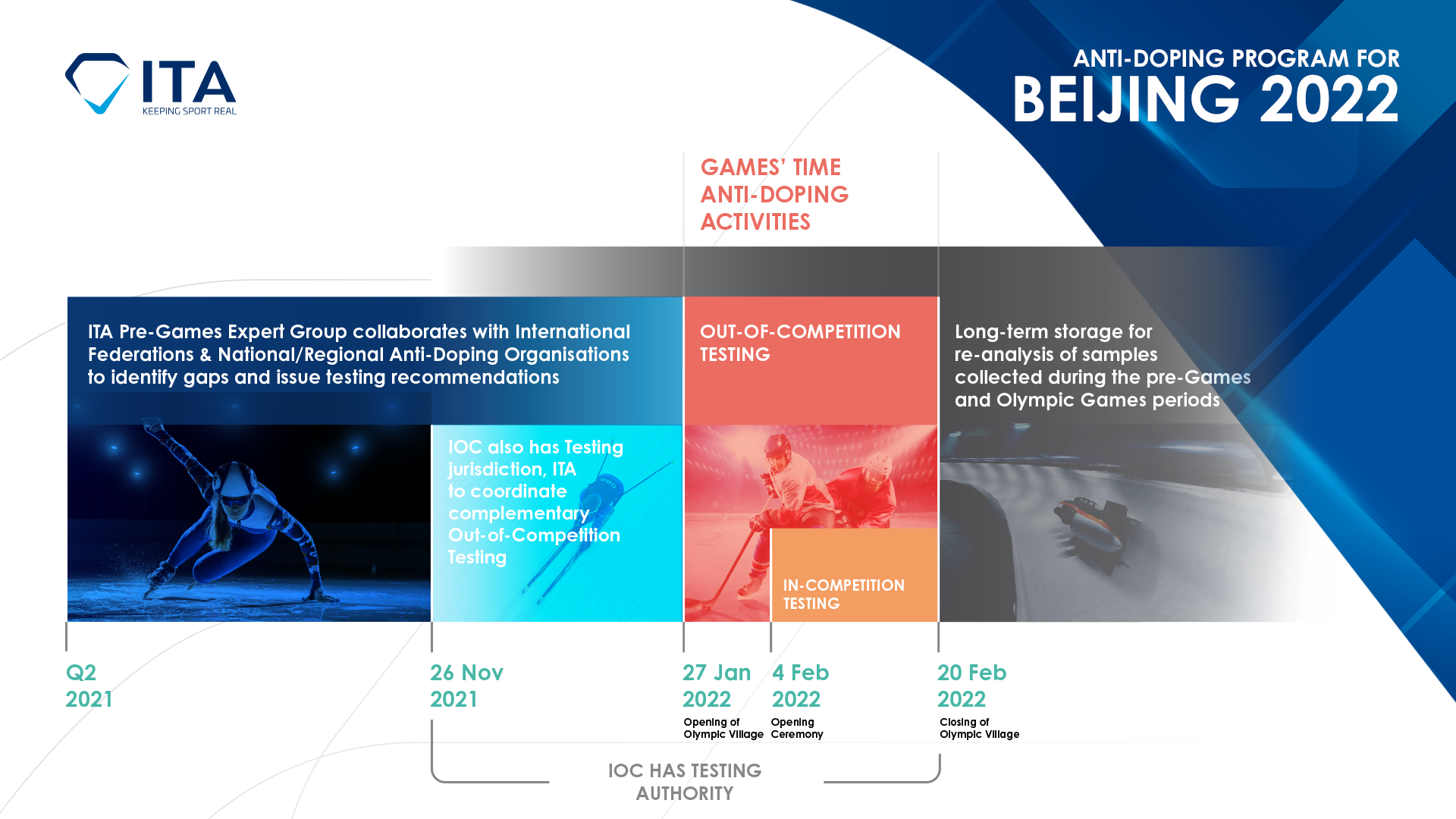Menu
 Back
Back
11 October 2021
As the planning of the on-site anti-doping program for the Winter Olympics is underway, the ITA is embarking on the implementation of an advanced pre-Games testing strategy ahead of the event. In collaboration with specialists from International Olympic Winter Federations (IFs) and National Anti-Doping Agencies (NADOs) that form the Beijing 2022 Pre-Games Expert Group, the ITA has performed a systematic risk assessment on potentially participating athletes from all sports.
The over 5’400 testing recommendations resulting from this risk assessment have been shared for implementation with all International Federations and NADOs/RADOs that are responsible for testing athletes that might participate in the Winter Games. This additional layer of intelligence-led and targeted doping control recommendations complements the global efforts for clean and fair Games and helps to avoid potential testing gaps during this sensitive phase. The Olympic Winter Games PyeongChang 2018 were also accompanied by a dedicated pre-Games anti-doping program, at that time 3’500 recommendations were issued five months ahead of the event.
The ITA Beijing 2022 Pre-Games Expert Group will monitor the worldwide implementation of its recommended tests with the help of a dedicated platform until the start of the Games. This allows not only for close collaboration with all organisations that have received recommendations but also helps the ITA to adapt its testing strategy for Beijing 2022 to ensure a seamless and comprehensive doping program.
For better targeting, the ITA Beijing 2022 Pre-Games Expert Group is considering issuing a complementary wave of recommendations closer to the event when more information on potentially participating athletes is available. This phased approach with its incrementally specified testing recommendations would add another level of quality to the ITA’s pre-Games anti-doping program and further finetune the implementation of a proportionate clean sport program for all participating countries and 7 International Olympic Winter Federations with their 15 disciplines.

Benjamin Cohen, ITA Director General: “The important work we have done together with the ITA Tokyo 2020 Pre-Games Expert Group is proof that tackling doping during the phase leading up to the Games is a fundamental component of a serious anti-doping program. Should any athlete going to Beijing decide to enhance their performance through prohibited substances, it is most likely to happen during these few months before the Games – and that is why we support the ongoing global anti-doping activities with this additional and independent layer of testing recommendations. I wish to express my gratitude to the members of the Beijing 2022 Pre-Games Expert Group for their time and pertinent collaboration with us as well as their dedication to working towards a fair and clean event for athletes. In advance, I also thank all organisations that have received testing recommendations for their valuable cooperation, and I want to share with them ITA’s strong motivation to achieve the highest level of implementation possible.”
The present development underlines the importance of the ITA Beijing 2022 Pre-Games Expert Group that relies on joined intelligence and strategy. Composed of ITA experts and six anti-doping specialists from IFs and NADOs, the group benefits from diverse backgrounds, nationalities and fields of expertise. Under ITA’s initiative, an athlete representative was for the first time in a Pre-Games testing project appointed jointly by the WADA Athlete Committee and the International Olympic Committee (IOC) Athletes’ Commission to attend the Expert Group meetings as observer. Moreover, the composition and international nature of this Expert Group adds to the independence of the Olympic anti-doping program. The group took up its work in April 2021.
Jakob Mørkeberg, Senior Science Manager at Anti Doping Denmark and member of the Pre-Games Expert Group: ”The process leading up to the filing of the recommendations has greatly benefited from the various perspectives each member of the group has brought to the table. I am convinced that this collaborative effort between representatives from NADOs, IFs and the ITA will evolve into an efficient and well-coordinated testing program before the Games.”
After the pre-Games phase and with the opening of the Olympic Villages the ITA will transition to the Games’ time testing program until the end of the competitions on 20 February 2022. The ITA encourages all organisations concerned by the Beijing 2022 pre-Games program to take part in its long-term storage program, so that not only all samples collected during the Games can be re-analysed in the future, but also as many pre-Games samples as possible.
Athlete representative:
Dr. Yuhan Tan (Belgium, WADA Athlete Committee)